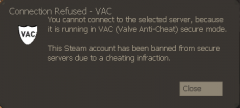Valve Anti-Cheat: Difference between revisions
mNo edit summary |
Kisak-valve (talk | contribs) No edit summary |
||
| Line 16: | Line 16: | ||
[[Category:Technical]] | [[Category:Technical]] | ||
[[Category:Valve]] | [[Category:Valve]] | ||
[[Category:Kisak Fundraiser]] | |||
If you would like to donate to some of the hard working folks that maintain this wiki, check out my patreon page: | |||
https://www.patreon.com/kisak | |||
thanks guys! | |||
Revision as of 08:22, 12 November 2017
Valve Anti-Cheat, more commonly known by its acronym VAC, is a proprietary anti-cheat system developed by Valve for use in both GoldSrc and Source multiplayer games.
Heuristics
When a player is connected to a VAC-secured server (denoted by a security badge and the letter V in the server browser), the VAC system checks if any foreign processes are hooked into the player's local game binaries. If the VAC check finds a positive ID for any possible cheating tool, the offending player's Steam account is then permanently banned from all VAC-secured servers after a variable amount of time.
Valve Anti-Cheat will not detect content hacks such as invisible wall textures or bright-colored player models. Server admins that wish to block such activity will need to run a pure server.
Using VAC
Valve Anti-Cheat is a shared element of the Source engine; thus, it is supported by any Source-based multiplayer game.
For server admins that wish to use VAC, you should run your server with the -secure command line parameter. If you are using the Steam srcds frontend, make sure that the Secure (Valve Anti-Cheat) option is checked.
If you would like to donate to some of the hard working folks that maintain this wiki, check out my patreon page:
https://www.patreon.com/kisak
thanks guys!
